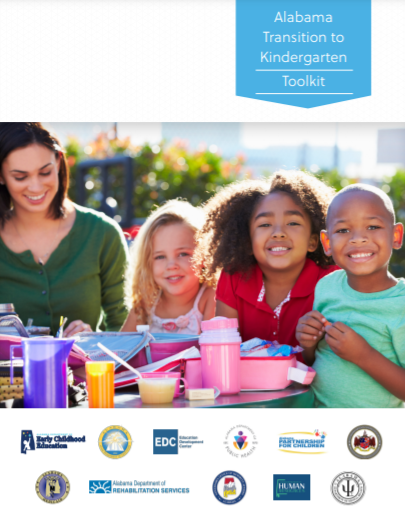
Alabama launched its new Transition to Kindergarten Toolkit in December. We have really appreciated the opportunity to partner with Alabama on this important resource. Congrats to Secretary Barbara Cooper (Department of Early Childhood Education), her team, and her colleagues in other agencies. Alabama asks me to convey its thanks to the Rhode Island Department of Education for inspiring the basic idea of this toolkit.
States and counties may get ideas they can adapt from the toolkit, and communities will find helpful guidance materials in sections 2-9.
The focus of the toolkit is on supporting local communities in developing and implementing effective transition to kindergarten plans. Here are a few highlights that may be of interest:
- Inter-agency collaboration. 8 state agencies and the AL Partnership for Children served on the team that oversaw the toolkit. Note the logos on the cover and the introductory letter signed by 8 agency heads. All of these agencies will link to the document.
- Guiding principles and practical tips. Section 2 is the heart of the toolkit and a good place to start. It combines Alabama’s approach to the transition, including a definition of readiness and guiding principles, with a planning process and practical tips for carrying out that process.
- An inclusive overview. Section 3 provides a succinct explanation of the 4-connection framework and a 6-step planning process. The original mainly referenced school districts and Head Start programs. The National Center for Early Childhood Development, Teaching, and Learning graciously allowed us to change the language to “ECE programs,” which makes the document more useful to local transition teams.
- Short briefs on important topics. The toolkit includes a number of 2-pagers on important topics such as family engagement and attendance. There is also a collection of essential Alabama Transition to K resources, including on combining funding sources, students with disabilities, mental health, family childcare, and supporting children who have not had formal prekindergarten experiences. You can find a few sample PreK to K child information forms at the end.
Tech tip: You can use Adobe Acrobat’s bookmarks feature to navigate from section to section.
We are also in the early stages of supporting the Alabama communities of Fairfield and Russellville in implementing First 10, both of which are off to great starts. We look forward to reporting on their progress in future posts.